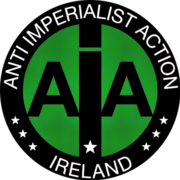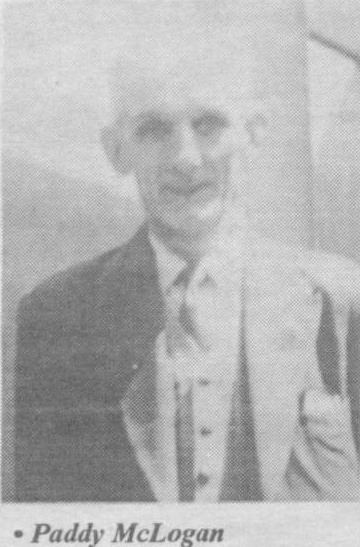Volunteer Paddy McLogan was born in Armagh in 1899, and was sworn into the Irish Republican Brotherhood by his Uncle in 1913, aged just 14. Later that same year he joined the Irish Volunteers at its formation and for the rest of his life, until his death in suspicions circumstances, remained a uncompromising militant and active Republican.
During the 1916 Rising, McLogan, by now aged 17, served in the GPO under Commandant General James Connolly and played an active part in the fight against the injustice of British Rule in Ireland. After the Rising McLogan was interned in Frongoch in Wales, but following the release of the prisoners, served as a driver and security for Countess Markievicz of the Irish Citizen Army.
In 1917, as the Republican Movement was being reorganised, McLogan was to the fore of it and was sent to Belfast to organise the Volunteers. Appointed Captain, McLogan Established a new fighting unit of the Republican Army in that City, D-Company, 1st Battalion Belfast Brigade. Later in 1917 McLogan was sent to organise Volunteers in Bray County Wicklow, where he was captured on Active Service.
Imprisoned in Mountjoy, McLogan joined the Hungerstrike of Republican Prisoners led by Thomas Ashe. Ashe would be murdered by the British through the torture of force-feeding while McLogan would be released on health grounds.
In the aftermath of the Hungerstrike McLogan returned to Armagh, and he provided security for the Republican Candidates in the 1918 General Election that saw the Republic of 1916 ratified by the overwhelming majority of the Irish People.
His skill as an organiser was now well recognised and McLogan appointed as O/C of the IRA in South Armagh and began making preparations for war. Throughout the Tan War McLogan proved a fearless operator and an effective leader, so much so that he was requested to assist the establishment and operations the IRA Brigade in North Antrim/ East Derry and remained an active service Volunteer until he was arrested in 1921.
McLogan remained loyal to the Republican and was imprisoned by the Free State at the outbreak of the Counter Revolution. Back in prison McLogan was elected the O/C of his wing and continued the fight against the Counter Revolution from within the Gaols.
Released in 1923, McLogan remained an active Republican and was involved in the reorganisaton of the Republican Movement once more. Despite the victory of the Counter Revolution, McLogan firmly believed that another fight in defence of the Republic must be organised, a fight that would defeat British Imperialism and the horror of partition.
In 1933 McLogan was elected as an Abstentionist Republican TD for South Armagh while at the same time remaining an Active IRA leader, and chaired the 1934 IRA Army Convention. In 1936, McLogan was elected Chairman of Cumman na Poblachta, a short lived overground political vehicle established by the IRA.
Durning the 1940s Campaign McLogan was again imprisoned, this time for the sale of Easter Lillies, and remained interned in the Curragh for most of the ‘40s.
While in the Curragh he developed a close comradeship with Tomais Óg McCurtain and Tony Mangan, a relationship that would ensure the future of the Revolutionary Republican Movement for years to come.
In the aftermath of the defeat of the 1940s campaign, Tony Mangan was elected as the Chief of Staff of the IRA, with McLogan and MacCurtain as leading figures on the Army Council. Known as the 3 Macs, the new leadership would get the IRA fit for purpose again and lead them into a new campaign for National Liberation.
As part of this reorganisation, McLogan was task with bringing Sinn Féin back under Army control, a task he carried out very successfully, becoming President of Sinn Féin in 1950, and ensuring other IRA Volunteers were appointed to prominent positions in the overground organisation.
McLogan also successfully brought the United Irishman Newspaper under Army Control, which led to an increase in readership and the United Irishman became the official organ of a Republican Movement growing in strength.
While concentrating on rebuilding Sinn Féin, McLogan remained a key military tactician and strategist for the IRA in the lead up to Operation Harvest, better known as the Border Campaign. Commenting on his role at this time Ruairí O’Bradaigh said, ‘He knew his people and his situation’.
In the course of the Border Campaign McLogan advocate that the IRA should engage in morale boosting ‘spectacular’ operations that would drive the growth of the IRA and the Revolution. He also proposed that the IRA should replace drilling with ‘battle schools’ as a means of training in real world tactics and was one of the first to advocate the replacing of Flying Columns with smaller 4/5 man Guerrilla Units.
In 1957, McLogan and almost the entire leadership of Sinn Féin were arrested at the Party’s Ard Fhéis and interned in the Curragh. However due to his health McLogan was released in 1958 and immediately reported back to the movement.
A short time later McLogan was sent to America to raise funds and support for the war at home, and began the important work of developing an arms supply network with George Harrison and Liam Cotter that would be a crucial network for the IRA in the 1970s.
Unsurprisingly, McLogan opposed the ending of the campaign in 1962 and stood down from the Sinn Féin Leadership as a result.
However he remained active in Sinn Féin and continued to oversee the importation and safe dumping of arms and ammunition through the networks he had set up, in preparation for the next campaign in the struggle for National Liberation.
Those close to McLogan recall that after the border campaign he became concerned that those rising to leadership positions were pushing a counter revolutionary position and he was determined that the arms he was importing for use in the fight for Irish Freedom would not fall under counter revolutionary control.
On the morning of July 21 1964, Volunteer Paddy McLogan was found dead at his home in Blachardstown West Dublin, with a 9mm Walther Revolver beside his body.
While some looked to blame British Intelligence for the murder, others suggested that the culprits were closer to home with blame for the execution being placed on those McLogan had identified as Counter Revolutionaries and some sources even stating that Cathal Goulding himself pulled the trigger.
Whatever the circumstance, Volunteer Paddy McLogan gave his life of the All Ireland Republic on July 21, 1964 and was buried in Mulhuddart Cemetery.
Despite playing a leading role in the Republican Movement since 1913 and for many years being at the very forefront of the struggle for National Liberation, McLogan is all but forgotten today.
As a veteran of 1916, the Tan War, the Counter Revolution, as a Hungerstriker, a 40s man, a prolific organiser of the IRA and one of the key leaders of the Republican Movement during the Border Campaign, as well as being a principled, uncompromising Physical Force Irish Republican throughout his life, Volunteer Paddy McLogan deserves to be remembered by genuine Irish Republicans today who remain committed to the vision of the All Ireland Republic.

